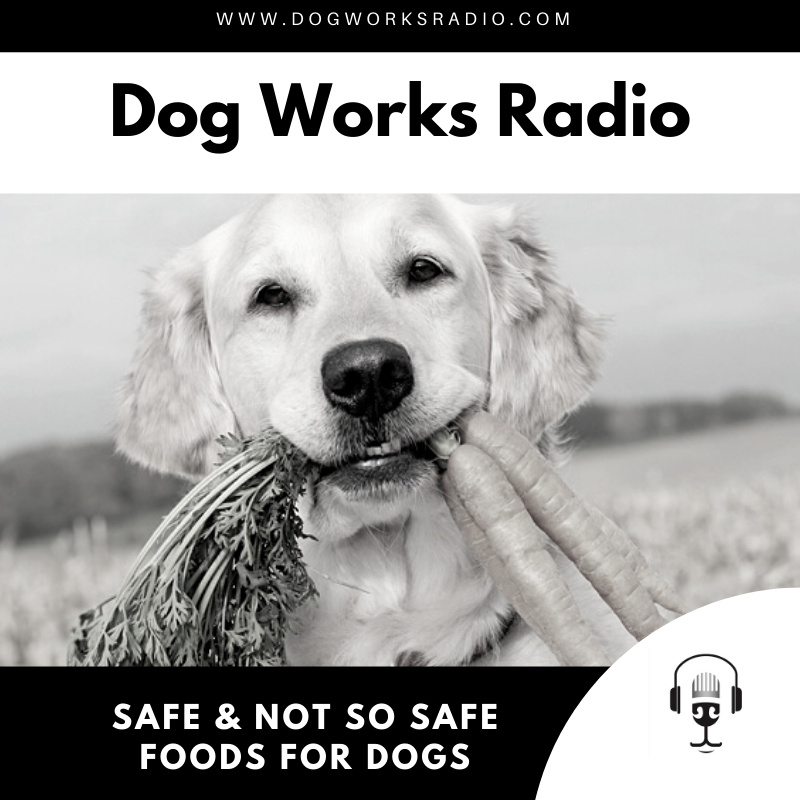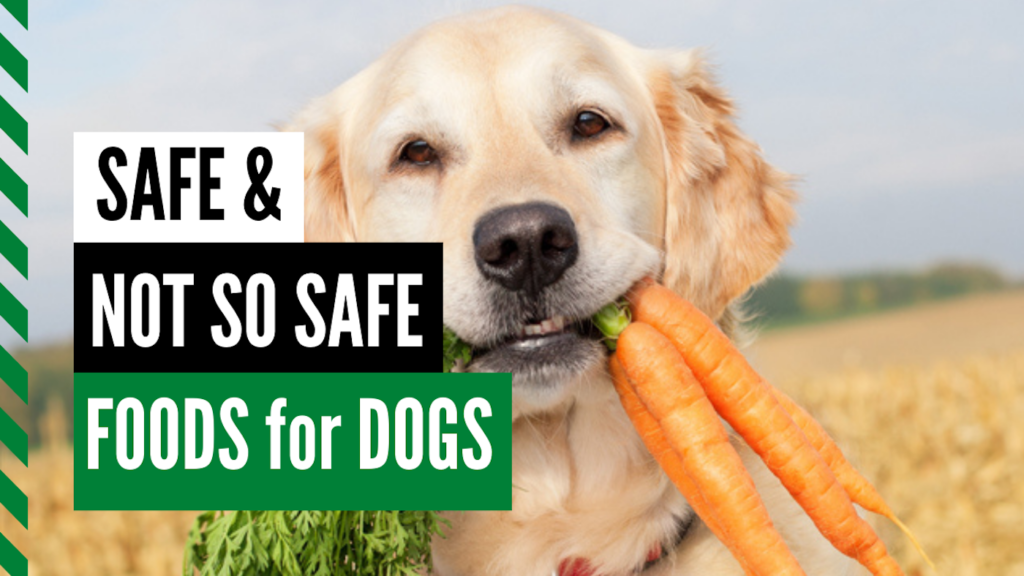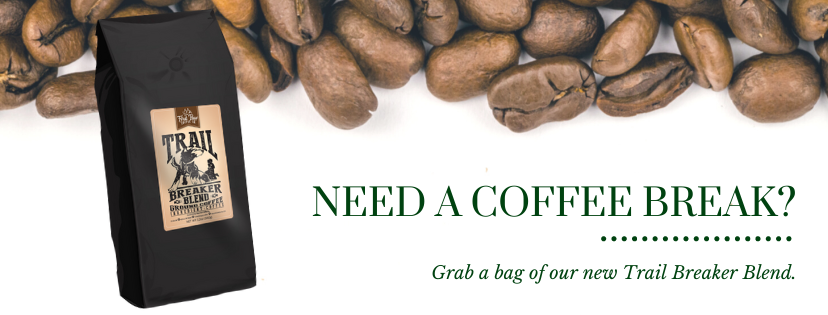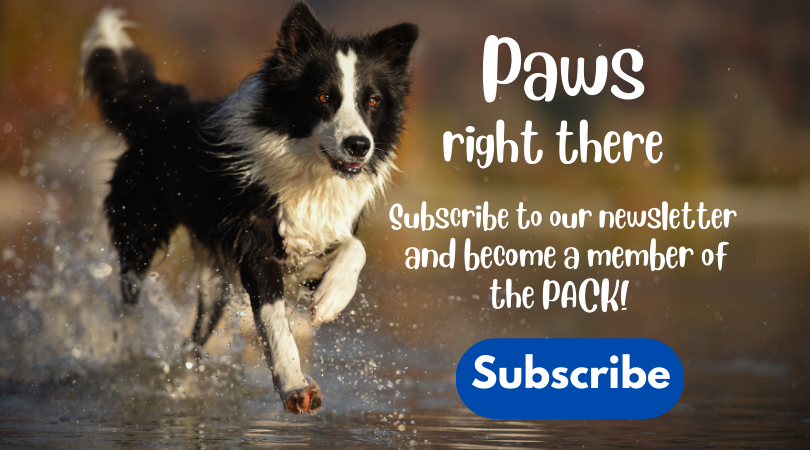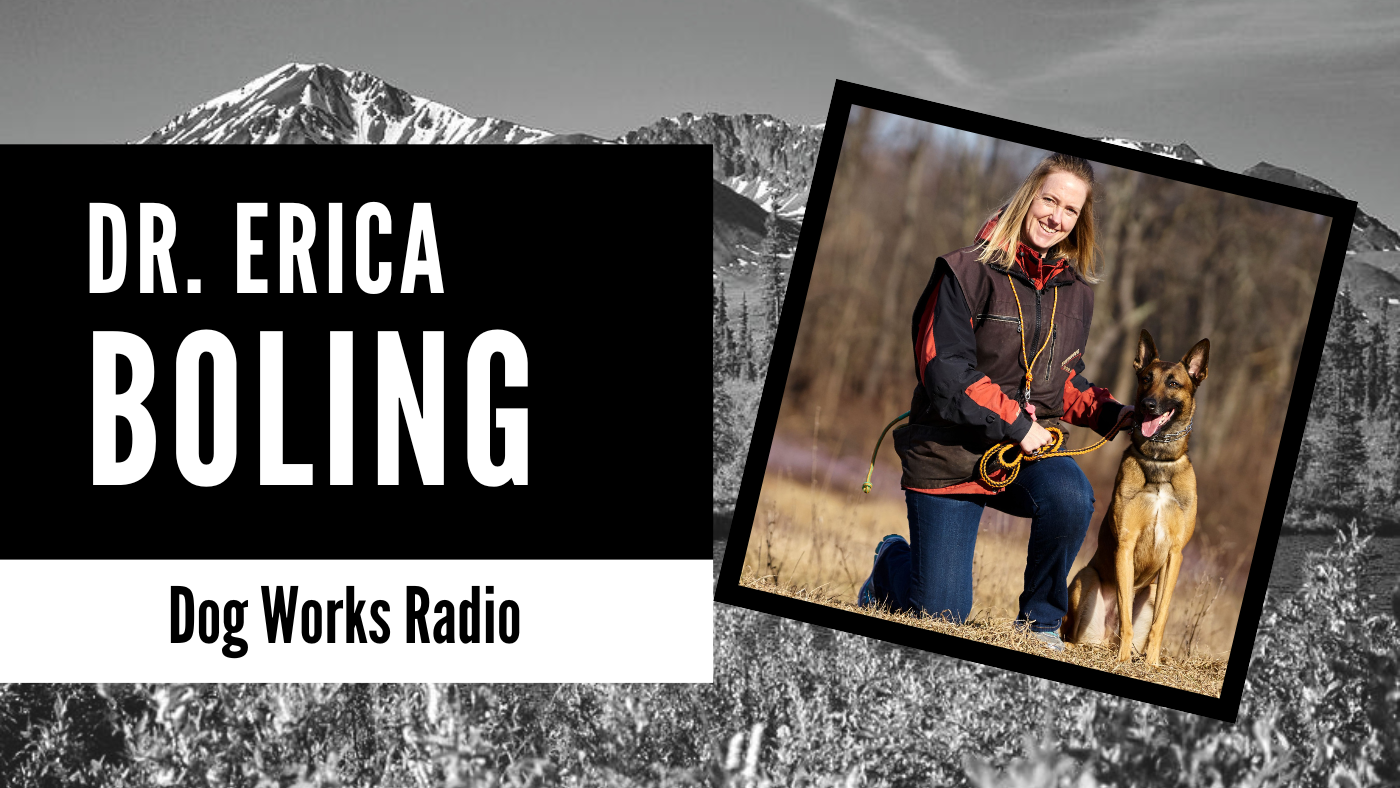Join host Michele Forto as she presents Safe and Not so Safe Foods for Dogs
Dedicated dog lovers tend to be very kind people. We share our hearts and homes, and for some lucky pups, even the foot of our beds, with our canine pals. Surely there is nothing wrong with sharing our favorite foods with them too, right? Not necessarily. Many of the foods, such as fruits and vegetables, that humans digest just fine can wreak havoc on a dog’s body, causing severe health problems. On the other hand, some of the foods people eat can be introduced to a dog’s diet just fine, and even provide health benefits such as joint strength, better breath, and allergy immunity.
What we talk about on this episode:
- Can you give your dog chocolate?
- Is shrimp safe for dogs?
- What is your dog’s favorite snack?
- Behind the Breed: Portuguese Water Dog
But before giving the dog foods that you crave, read on and learn which foods are safe and which can send your dog straight to the vet. What are some of your K9 Buddy’s favorite snacks? Our two Siberians Bodhi and Raegan like a bunch of stuff. In fact, do you remember that Life cereal commercial from the 1980s with the little kid named Mikey? Bodhi, like Mikey, likes everything!
Bodhi and Raegan love the occasional Nilla Wafer, cheese, pizza, popcorn, a bite of ice cream, and did you know that every night before bed they each get a few skittles.
So, on today’s show we are talking about Human Foods for Dogs. The do’s and don’ts and if you stick around until the end you can learn about a breed that makes our top five list as an adventure dog and they are known herd fish into nets, retrieve lost tackle, and act as a messenger between ships and shore. Can you guess which breed it is? Let me give you a hint, a former president has one named Bo!
Hello and welcome to Dog Works Radio. I am Michele Forto, and I am the lead trainer of Alaska Dog Works. Here we help humans, and their dogs have better relationships. Today we are going to learn which are Safe and Not so Safe Foods for Dogs. We have quite the list. Before we get started please do us a favor and hit that subscribe button.
Almonds: No, dogs shouldn’t eat almonds. Almonds may not necessarily be toxic to dogs like pecans, walnuts, and macadamia nuts are, but they can block the esophagus or even tear the windpipe if not chewed completely. Salted almonds are especially dangerous because they can increase water retention, which is potentially fatal to dogs prone to heart disease.
Bread: Yes, dogs can eat bread. Small amounts of plain bread (no spices and definitely no raisins) won’t hurt your dog, but it also won’t provide any health benefits either. It has no nutritional value and can really pack on the carbohydrates and calories, just like in people. Homemade breads are a better option than store-bought, as bread from the grocery store typically contains unnecessary preservatives, but it’s best to avoid it altogether.
Cashews: Yes, dogs can eat cashews. Cashews are OK for dogs, but only a few at a time. They’ve got calcium, magnesium, antioxidants, and proteins, but while these nuts contain less fat than others, too many can lead to weight gain and other fat-related conditions. A few cashews make a nice treat, but only if they’re unsalted.
Cheese: Yes, dogs can eat cheese in small to moderate quantities. As long as your dog isn’t lactose intolerant, which is rare, but still possible in canines, cheese can be a great treat. Many kinds of cheese can be high in fat, so go for low-fat varieties like cottage cheese or mozzarella.
Chocolate: No, dogs should not eat chocolate. This isn’t just an old wives’ tale. Chocolate contains very toxic substances called methylxanthines, which are stimulants that stop a dog’s metabolic process. Even just a little bit of chocolate, especially dark chocolate, can cause diarrhea and vomiting. A large amount can cause seizures, irregular heart function, and even death. Do not have chocolate in an accessible location. If your dog does ingest chocolate, contact a veterinarian or Pet Poison Helpline as soon as possible.
Cinnamon: No, cinnamon is not OK for dogs. While cinnamon is not actually toxic to dogs, it’s probably best to avoid it. Cinnamon and its oils can irritate the inside of dogs’ mouths, making them uncomfortable and sick. It can lower a dog’s blood sugar too much and can lead to diarrhea, vomiting, increased, or decreased heart rate, and even liver disease. If they inhale it in powder form, cinnamon can cause difficulty breathing, coughing, and choking.
Coconut: Yes, coconut is OK for dogs. This funky fruit contains Lauric, which strengthens the immune system by fighting off viruses. It can also help with bad breath and clearing up skin conditions like hot spots, flea allergies, and itchy skin. Coconut milk and coconut oil are safe for dogs too. Just be sure your dog doesn’t get its paws on the furry outside of the shell, which can get lodged in the throat.
Corn: Yes, dogs can eat corn. Corn is one of the most common ingredients in most dog foods. However, the cob can be hard for a dog to digest and may cause an intestinal blockage, so if you’re sharing some corn, make sure it is off the cob.
Eggs: Yes, it’s OK for dogs to eat eggs. Eggs are safe for dogs as long as they are fully cooked. Cooked eggs are a wonderful source of protein and can help an upset stomach. However, eating raw egg whites can give dogs biotin deficiency, so be sure to cook the eggs all the way through before giving them to your pet.
Fish: Yes, dogs can eat fish. Fish contains good fats and amino acids, giving your dog a nice health boost. Salmon and sardines are especially beneficial — salmon because it’s loaded with vitamins and protein, and sardines because they have soft, digestible bones for extra calcium. With the exception of sardines, be sure to pick out all the tiny bones, which can be tedious but is definitely necessary. Never feed your dog uncooked or undercooked fish, only fully cooked and cooled, and limit your dog’s fish intake to no more than twice a week.
Garlic: No, dogs shouldn’t eat onions. Like onions, leeks, and chives, garlic is part of the Allium family, and it is five times more toxic to dogs than the rest of the Allium plants. Garlic can create anemia in dogs, causing side effects such as pale gums, elevated heart rate, weakness, and collapse. Poisoning from garlic and onions may have delayed symptoms, so if you think your dog may have eaten some, monitor him or her for a few days, not just right after consumption.
Ham: Yes, dogs can eat ham. Ham is OK for dogs to eat, but certainly isn’t the healthiest for them. Ham is high in sodium and fat, so while sharing a small piece is all right, it shouldn’t be a continuous habit.
Honey: Yes, dogs can eat honey. Honey is packed with countless nutrients such as vitamins A, B, C, D, E, and K, potassium, calcium, magnesium, copper, and antioxidants. Feeding dogs small amounts of honey can help with allergies because it introduces small amounts of pollen to their systems, building up immunity to allergens in your area. In addition to consuming honey, the sticky spread can also be used as a topical treatment for burns and superficial cuts.
Ice cream: No, dogs shouldn’t eat ice cream. As refreshing of a treat as ice cream is, it contains lots of sugar so it is best not to share with your dog. Also, some canines have an intolerance to lactose. To avoid the milk altogether, freeze chunks of strawberries, raspberries, apples, and pineapples and give them to your dog as a sweet, icy treat.
Macadamia nuts: No, dogs should not eat macadamia nuts. These are some of the most poisonous foods for dogs. Macadamia nuts, part of the Protaceae family, can cause vomiting, increased body temperature, inability to walk, and lethargy. Even worse, they can affect the nervous system. Never feed your dog macadamia nuts.
Milk: Yes, dogs can have milk. But be cautious. Some dogs are lactose-intolerant and don’t digest milk well. While it is OK for dogs to have a little milk, owners should be cognizant of the symptoms of lactose-intolerance and might want to stick to giving their dogs water.
Peanut butter: Yes, peanut butter is OK for dogs. Peanut butter can be an excellent source of protein for dogs. It contains heart-healthy fats, vitamins B and E and niacin. Raw, unsalted peanut butter is the healthiest option because it doesn’t contain xylitol, a sugar substitute that can be toxic to dogs.
Peanuts: Yes, dogs can eat peanuts. Unlike almonds, peanuts are safe for dogs to eat. They’re packed with good fats and proteins that can benefit your dog. Just be sure to give peanuts in moderation, as you don’t want your dog taking in too much fat, which can lead to pancreas issues. Also, avoid salted peanuts.
Popcorn: Yes, dogs can eat popcorn. Unsalted, unbuttered, plain air-popped popcorn is OK for your dog in moderation. It contains riboflavin and thiamine, both of which promote eye health and digestion, as well as small amounts of iron and protein. Be sure to pop the kernels all the way before giving them to your dog, as unpopped kernels could become a choking hazard.
Pork: Yes, dogs can eat pork. Pork is a highly digestible protein, packed with amino acids, and it contains more calories per pound than other meats. Pork also may be less likely to cause an allergic reaction in some pets compared to other meat.
Quinoa: Yes, quinoa is OK for dogs. Quinoa is actually an ingredient in some high-quality dry dog foods. The strong nutritional profile of quinoa makes it a healthy alternative to corn, wheat, and soy — starches that are often used to make kibble.
Salmon: Yes, dogs can eat salmon. As mentioned above, fully cooked salmon is an excellent source of protein, good fats, and amino acids. It promotes joint and brain health and gives dog-immune systems a nice boost. However, raw or undercooked salmon contains parasites that can make dogs very sick, causing vomiting, diarrhea, dehydration, and, in extreme cases, even death. Be sure to cook salmon all the way through (the FDA recommends at least 145 degrees Fahrenheit) and the parasites should cook out.
Shrimp: Yes, shrimp is OK for dogs. A few shrimp every now and then is fine for your dog, but only if they are fully cooked and the shell (including the tail, head, and legs) is removed completely. Shrimp are high in antioxidants, vitamin B-12, and phosphorus, but also low in fat, calories, and carbohydrates.
Tuna: Yes, dogs can eat tuna. In moderation, cooked, fresh tuna is an excellent source of omega-3 fatty acids, which promotes heart and eye health. As for canned tuna, it contains small amounts of mercury and sodium, which should be avoided in excess. A little bit of canned tuna and tuna juice here and there is fine — prepared only in water, not oil — as long as it doesn’t contain any spices.
Turkey: Yes, dogs can eat turkey. Turkey is fine for dogs as long as it is not covered in garlic (which can be very toxic to dogs) and seasonings. Also be sure to remove excess fat and skin from the meat and don’t forget to check for bones; poultry bones can splinter during digestion, causing blockage or even tears in the intestines.
Wheat/grains: Yes, dogs can eat wheat and other grains. Dogs do not have to be grain-free; it is perfectly OK for them to have grains. In fact, grains like wheat and corn are great sources of protein, essential fatty acids, and fiber. If your dog has certain allergies, however, it might be best to avoid grains, but it truly depends on your dog.
Yogurt: Yes, yogurt is OK for dogs. Plain yogurt is a perfectly acceptable snack for dogs. However, some canines may have trouble digesting it. If your dog can digest it, the active bacteria in yogurt can help strengthen the digestive system with probiotics. Be sure to skip over yogurts with added sugars and artificial sweeteners.
Let’s learn all about the Portuguese Water Dog
The Portuguese Water Dog is super-smart and very biddable—meaning he’s easy to train and eager to please. The breed can be groomed in two styles: The retriever clip (the entire coat is clipped to one inch in length, with the tail tip at full length) or the more check-me-out lion clip, where the coat on the hindquarters and muzzle is clipped down to the skin.
History
The Portuguese Water Dog once lived all along Portugal’s coast and was used to herd fish into nets, retrieve lost tackle, and act as a messenger between ships and shore. Fishermen counted on the strong and muscular dogs to be hardworking and seaworthy. They would ride in trawlers from the warm Atlantic waters of Portugal to the freezing cold waters off the coast of Iceland. Technology eventually laid him off from his job, but the breed is still used for water rescue.
Quick Facts
- Temperament: Affectionate, Adventurous, Athletic
- AKC Breed Popularity:Ranks 50 of 197
- Height:20-23 inches (male), 17-21 inches (female)
- Weight:42-60 pounds (male), 35-50 pounds (female)
- Life Expectancy:11-13 years
- Group:Working Group
GENERAL APPEARANCE
This highly intelligent utilitarian breed is distinguished by two coat types, either curly or wavy; an impressive head of considerable breadth and well-proportioned mass; a ruggedly built, well-knit body; and a powerful, thickly based tail, carried gallantly or used purposefully as a rudder. The Portuguese Water Dog provides an indelible impression of strength, spirit, and soundness.
Care and Training
The Portuguese Water Dog should do well on high-quality dog food, whether commercially manufactured or home-prepared with your veterinarian’s supervision and approval. Any diet should be appropriate to the dog’s age (puppy, adult, or senior). Some dogs are prone to getting overweight, so watch your dog’s calorie consumption and weight level. Treats can be an important aid in training, but giving too many can cause obesity. Learn about which human foods are safe for dogs, and which are not. Check with your vet if you have any concerns about your dog’s weight or diet. Clean, fresh water should be available at all times.
The Portuguese Water Dog’s dense, profuse coat is hypoallergenic but requires regular and extensive grooming. The coat ranges in appearance from tight and curly to loose and wavy. It may be kept in the lion clip (where the coat on the hindquarters and muzzle is clipped to the skin) or the retriever clip (where the entire coat is clipped to one inch in length and follows the outline of the dog). Beyond regular weekly grooming, an occasional bath will keep the Portie clean and looking his best.
An athletic, active breed, the Portuguese Water Dog requires vigorous exercise every day to keep him healthy and happy. This can come in the form of long daily walks and play sessions with his owner. This extremely versatile breed also exercises mind and body by participating in canine sports such as obedience, tracking, agility, rally, dock diving, and other activities that can be enjoyed by dog and owner. For many enthusiasts, the most special of all the training and exercise options for the Portie is water work.
The Portuguese Water Dog is very intelligent and responds well to obedience training. He is demanding of attention and human contact and greets friends and family with unbridled enthusiasm. The breed often thinks independently, and a Portie may sometimes challenge his owner’s will. He requires positive training methods as well as daily mental and physical exercise. Porties can sometimes be too exuberant for families with very young children.
Portuguese Water Dogs are generally healthy, and responsible breeders test their stock for health disorders and communicate with other dedicated breeders regularly, working together for breed health and preservation of the breed’s unique qualities. A Portie’s ears should be checked regularly for signs of infection, and the teeth should be brushed often, using a toothpaste designed for dogs.
Did you know that 44th President Barack Obama owns two water dogs named Bo and Sunny?
The Portuguese Water Dog was recognized by the AKC in 1983 and is its 128th breed.
The Portuguese Water Dog coat is profuse, non-allergenic, non-shedding, and waterproof,
The Portie has webbed feet.
When Portugal faced social upheaval in the early 20th century, Dr, Vasco Bensuade, a wealthy Portuguese shipping magnate and dog fancier, took it upon himself to save the Portie breed.
Adventure Dog
Did you know that the Portie is one of our two five adventure dog breeds? This cheerful fellow is a champ: he was made for hard work, herding fish, retrieving lost tackle or broken nets, swimming as a courier between ships or from ship to shore, and in general, shines in the surf—there is not much he hasn’t done. But in spite of his love for the water, he’s at home on terra firma, too. So, if your hiking adventures will take you to the beach or the lake, he’s the top dog. Above all, be prepared for an active lifestyle: the Portuguese Water Dog is adventurous and thrives on daily mental stimulation and physical exercise. Like the Lab, he possesses a friendly demeanor which makes other hikers comfortable around him. But he also loves being within sight of you; this makes him an excellent companion on the trail, ill-suited to leave alone for long periods.
It is now time our calendar of events. For those that are listening locally on KVRF or our current and past clients stay tuned for important announcements, for our other listeners, stick around and you might learn something cool.
We are continuing on with:
- Dog Training Education Month.
- Did you know that Feb. 14: Pet Theft Awareness Day. Who would steal a dog on Valentines Day, anyway?
- Feb. 19: National Boston Terrier Day. These little gentlemen have been a part of our training programs on many occasions! Do you have one of these little dogs? Head over to alaskadog works.com and type Boston terrier in the search bar and you can learn all about how to make your Boston Terrier one of the best trained dogs.
- Feb. 20: Love Your Pet Day
In early April we will be at the Mat Su Outdoorsman show at the Alaska State Fairgrounds in Palmer for this three-day event. Come out and say hello. We like it when you say hi. We will also have all of our coffee blends on sale, a bunch of gear and you can learn all about our adventure dog club just in time for spring. We are excited about this one. It was canceled last year because of COVID but this year is supposed to be bigger than ever. Not only will we be there but there will be food trucks, live events, demonstrations, and much more. This is the premier event for anyone that is interested in getting outdoors in Alaska.
On April 17 we will be starting our group classes in the park. They will be held at wonderland park in Wasilla at 11:30 am. These are free for our current and past clients and are part of your training package. If you are not a client or just want to check us out, this is a great way. We do have a nominal drop-in fee.
We are gathering gear for our first ever nose work class and treiball and Robert is thinking about doing pack walks again too. If you want to get an idea what we will be doing, head on over and watch the Pack on Amazon Prime Video. It is a really cool show!
Did you know that every Wednesday and Sunday night we do a Facebook live at 7pm? Be sure to check us out. If you miss the live broadcasts you can always tune in later too.
Also, stay tuned for info about the summer festival, how you can train your dog to run in the Alaska dog works dryland derby this fall, and much more. As always you can keep up to date by following us on our social channels, just search dog works radio and for more training tips and tricks and to learn how to schedule a free discovery call to talk with us about how to make your dog one of the best, visit Alaska dog works.com
One last thing did you know the single best thing you can do is tell your family and friends about our show. Why don’t you send them a link to this episode and they too will soon be a rabid listener?
Host, Michele Forto’s Bio: Michele Forto is the lead trainer for Alaska Dog Works where they train dogs for service work, obedience, and more. Michele is also the business manager and husky wrangler for Team Ineka. When Michele is not training dogs she loves to travel on their annual Rock n Roller Tours where she and Robert hit up rock concerts and roller coasters around the country.
Host, Robert Forto’s Bio: Robert Forto is the training director for Alaska Dog Works where they train dogs for canine obedience, working dogs, therapy dogs, and service dogs for clients all over North America. He is also a dog musher and he and his wife operate a 36-dog mushing kennel in Willow, Alaska, called Team Ineka. They can often be seen at local races and leading expeditions in the Alaska backcountry with outdoor leadership students at the University of Alaska. Robert is the producer of Dog Works Radio that has been on the air since 2009 and is currently simulcast on a local radio station, KVRF in Palmer, Alaska.
Links and Resources Mentioned:
- RSS feed for our show: https://dogworksradio.libsyn.com/rss
- Alaska Dog Works
- First Paw Coffee
- Robert Forto on Twitter: @robertforto
- Dog Works Radio on Twitter: @dogworksradio
- Michele Forto on Twitter: @micheleforto
- Alex Stein on Twitter: @coldfootfilms
- Dog Works Radio on Facebook
- Dog Works Radio on Instagram
- KVRF in Alaska
Thanks for Listening! We appreciate your visiting our site today and for help in bringing awareness to the Dog Works Radio podcast
Where we are going? (In real life)
- Rock n Roller Coaster Tour 21 #rocknroller21 to live host The Coaster Geeks Podcast
- Podcast Movement 21 in Nashville in August #PM21
Audience feedback drives the show. We would love for you to email us and keep the conversation going! Email live@dogworksradio.com or call us at 907-841-1686
-
- We would love to hear from you!
Help us spread the word! We would love it if you could please share #DogPod with your Twitter followers. Click here to post a tweet If you dig this episode head over to Apple Podcasts and kindly leave us a rating or a review and subscribe!
Ways to subscribe to Dog Works Radio
Feedback and Promotion You can ask your questions, make comments, and request a show topic! Let your voice be heard.
-
- Email live@dogworksradio.com
- Book an interview on the show
- Take the Survey
